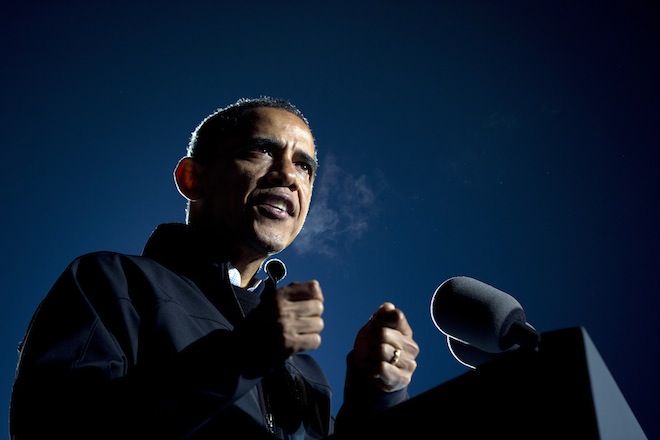In the week since the election, Republicans have wrung their hands endlessly about the need to change course, lest their unpopular views on issues from taxes to immigration render them unelectable in future national campaigns.
But when it comes to actual policymaking, their demands in budget negotiations with President Obama are familiar: No higher tax rates plus vague promises of higher revenue via tax simplification that lowers tax rates — and even then, to get their concession on revenue, Obama needs to agree to cut entitlements.
That’s not much of an offer from the side that lost the election. Obama wants to kick things off by asking top earners to pony up about $1 trillion in revenue over 10 years, preferably by returning their top marginal rates to 39.6 percent, where they were during the Clinton administration.
Now a number of influential conservatives are publicly urging Republicans to bring a different approach to the negotiations — one that echoes a proposal Mitt Romney was floating toward the end of his failed presidential campaign. The essence of their new pitch is this: keep tax rates where they are but close the loopholes that benefit high earners.
“Tax deductions should be scaled back, especially in the areas of mortgage interest, charitable giving and employer-provided health insurance,” writes Glenn Hubbard — one of Mitt Romney’s economic advisers. “The first step is to raise average (not marginal) tax rates on upper-income taxpayers. Revenue increases should first come from these individuals. This means closing loopholes.”
Get that?
Hubbard wants Obama to embrace a piece of Romney’s old tax plan: raise revenue by limiting or eliminating tax expenditure benefits for the wealthy. The Chamber of Commerce has suggested it could support a similar source of new revenue. And, broadly, the proposal, taken alone, is a progressive one.
But what’s in it for Obama?
First, it would require him to back off his pledge not to extend Bush tax cuts for high earners. It would also likely result in less revenues from top earners than a straightforward tax rate hike. And liberals are concerned that the result will be higher overall taxes on middle class earners to make up the difference.
“I think you ultimately need both of those things, you’re going to need higher rates, and tax expenditure reforms,” says Chuck Marr, a federal tax expert at the liberal-leaning Center on Budget and Policy Priorities. “Lowering rates is a trap. … There’s no question that some of these tax expenditures are poorly designed, that there are good reforms that are efficient and equitable that can raise a significant amount of money and they should be done.”
In a New York Times op-ed, former Clinton Treasury Secretary Robert Rubin addressed the GOP’s push directly. “For plans that both reduce deficits and lower rates, some suggest that, instead of raising the top two brackets to Clinton-era levels, we can find the same revenues by limiting tax expenditures for those groups,” he wrote. “That would have some meaningful negative policy impacts, unlike increasing the top rate. The bigger problem is that such a step would yield only a fraction of the necessary revenue, requiring higher taxes on the middle class.”
Obama’s plan to let the high-income Bush tax cuts expire nets him a bit less than $1 trillion over 10 years. But he ultimately wants tax revenues to increase by about $1.6 trillion, by limiting tax expenditures on the same group of top earners. Trying to net the entire $1.6 trillion on the expenditure side of the tax code would almost certainly require raising taxes on middle income earners, according to the Tax Policy Center.
In January, TPC analyzed (PDF) the revenue and distributional effects of three plans to limit tax expenditures. Each would raise over $2 trillion over 10 years. But each would also require millions of middle class taxpayers to pay higher taxes — something Obama’s pledged not to do.
That strongly suggests Obama won’t be able to beg off his pledge to at least slightly increase marginal rates on high income earners. But keeping those rates low is perhaps the right’s highest priority. Republicans and conservative policy wonks believe expenditures lead people to allocate their money inefficiently, and that higher tax rates create a work disincentive that inhibits economic growth. They also know which side of their bread is buttered. And they’re sparing no effort to keep the current tax rates in place into next year.
Which is why the only way around this conundrum is to let all the Bush tax cuts expire, and reinstate middle-income tax cuts early next year. And why White House allies want the public to know that’s on Republicans.
“Boehner has no interest in doing this,” says former Rep. Tom Perriello, who now chairs the Center for American Progress Action Fund. “So we’ve gotta be ready to go off the cliff — or the Republicans are going to push us over — and figure out a way to turn the cliff into a ramp.”










